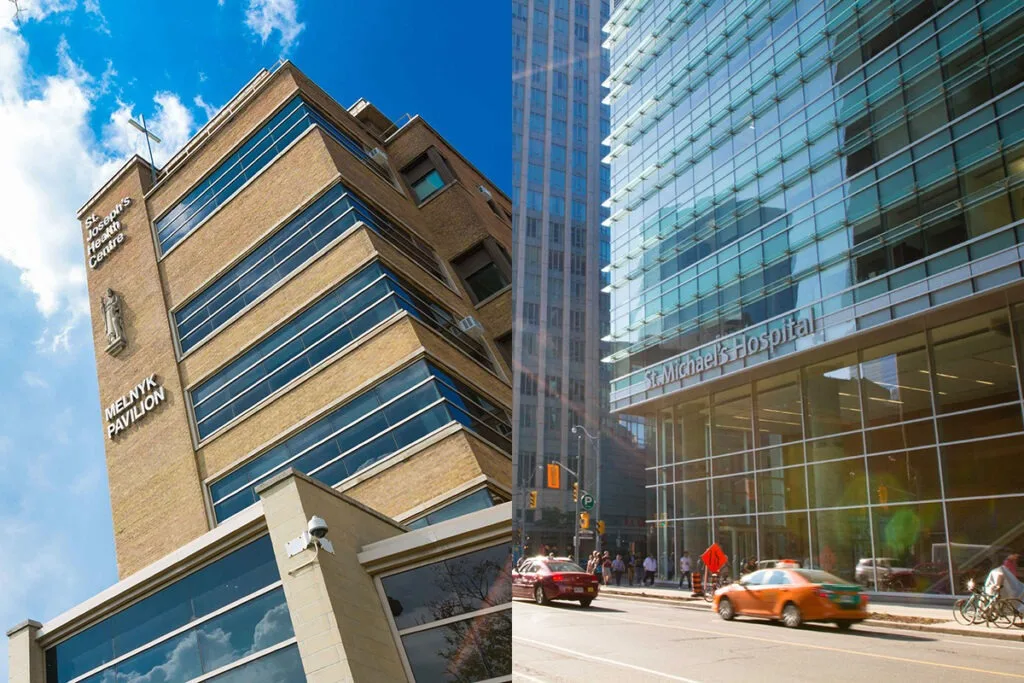
Sign up for the Unity Health Toronto newsletter, a monthly update on the latest news, stories, patient voices and research emailed directly to subscribers. If you haven’t subscribed yet, you can do that by clicking here.
Unity Health Toronto’s youth mental health programs received a transformative gift on Tuesday after The Slaight Family Foundation announced that St. Joseph’s Health Centre and St. Michael’s Hospital are among the recipients of funding to expand services for youth experiencing mental health issues.
The two hospitals are among 19 organizations including national charities, Greater Toronto Area hospitals and community service providers who received a portion of a $26.5 million donation from The Slaight Family Foundation. The aim of the initiative is to enable recipient organizations to provide new or enhanced models of care, including establishing a continuum of care that youth will receive after being discharged from hospital. This includes implementing better and more realistic models and programs that can be replicated across the country for youth experiencing mental health issues —particularly those from underserved and vulnerable communities.
At Unity Health, the funding will enhance programing for transitional aged youth at St. Joseph’s and St. Michael’s. Read on for more details about these innovative and much-needed programs.
Offering ongoing support for transitional-aged youth with psychosis at St. Joseph’s Health Centre
The Slaight Family Foundation Recovery and Reintegration Program, which supports transitional age youth with psychosis, enables coordinated access to care for at-risk youth when they need it most.
This outpatient program expands the youth mental health services that St. Joseph’s Health Centre currently offers and supports transitional age youth who have been treated at the hospital with first-time experience of psychosis, chronic schizophrenia, or schizoaffective disorder to receive the ongoing support and counselling they need.
Housed in a safe, dedicated space in the west end community, St. Joseph’s Health Centre will coordinate the recovery phase of their care with LAMP Community Health Centre, an exceptional partner in connecting people to programming and services that help build their own personal resources, empowering individuals to control their own health and well-being.
Patients will receive culturally sensitive therapy and support for a maximum of three years, including an easy-to-access process through a centralized intake model; group and individual therapy; psychiatrist assessments that explore what drives psychosis such as trauma and substance abuse; treatment planning; recovery programming; vocational reintegration (i.e. age-appropriate self-actualization and functional reintegration, such as through employment/school/life skills); peer support; Cognitive Behavioral Therapy for psychosis; and Family Intervention Therapy.
St. Joseph’s Health Centre will also ensure these patients have access to the Metabolic Clinic for ongoing prescription management, primary care access, wellness, and monitoring.
Creating priority care pathways for Black youth at St. Michael’s Hospital
Wait times for mental health care services among Black patients averages 16 months – more than twice the wait times for white patients. St. Michael’s Hospital’s community referral partners, Black Youth Helpline and Wanasah, have expressed difficulties in accessing psychiatric assessment and OHIP-covered psychotherapy for their patients — populations that are already disadvantaged.
This new funding will help St. Michael’s Hospital build upon its existing partnerships with Black Youth Helpline and Wanasah to co-design and co-deliver a pilot program for transitional aged youth, creating priority care pathways for Black transitional aged youth.
The program will provide culturally safe spaces where Black transitional aged youth can receive timely assessment by a psychiatrist, resulting in a detailed treatment plan, and a referral either to existing, funded resources, including cognitive behaviour therapy and medication treatment, or to Dialectical Behavioural Therapy (DBT).
The hospital will develop a DBT program tailored to Black transitional aged youth, as well as their families and networks, including an online module to help youth to understand the mental distress they are facing and how to access support and treatment resources. The development of online, self-paced skills modules will be adaptable to be relevant and effective for marginalized youth from other racialized communities. It will also provide greater access to this program and will help sustain its delivery beyond the walls of St. Michael’s.

